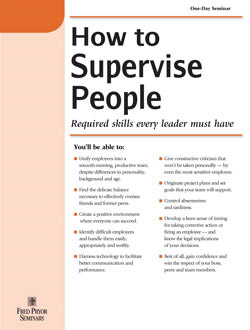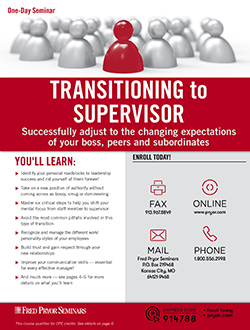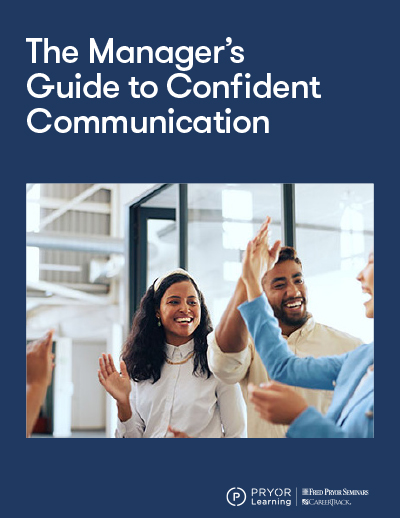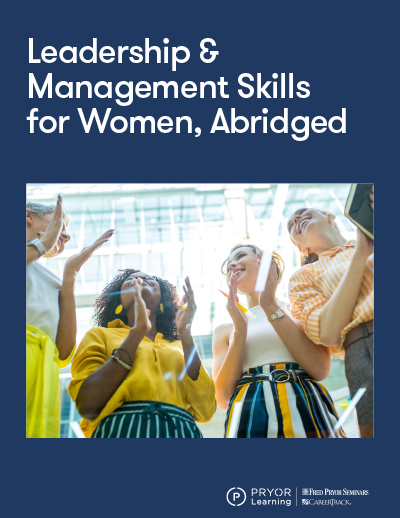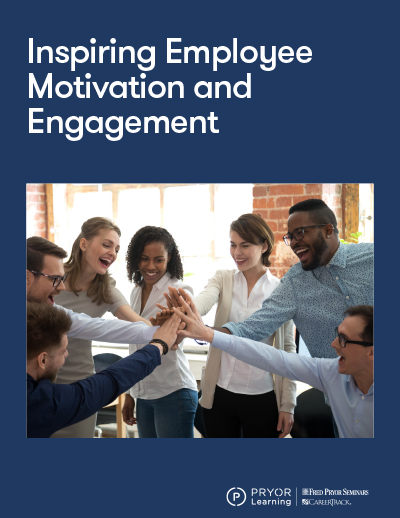Management & Leadership Training
Transform supervisors into strong leaders with management and leadership training that emphasizes coaching, troubleshooting and team-building skills. Our programs help supervisors develop into confident leaders who inspire productivity and build high-performing teams.
What You’ll Gain from Our Programs
Our supervisor training and leadership development programs help organizations and individuals alike:
- Transform supervisors into effective, inspiring leaders.
- Improve employee motivation, engagement and retention.
- Build essential conflict resolution and team-building skills.
- Learn compliance essentials and best practices for managers.
- Strengthen productivity and workplace culture with proven leadership techniques.
Why Choose Pryor?
With over 50 years of experience in leadership and management training, Pryor is trusted by organizations nationwide. Our expert instructors deliver dynamic, interactive sessions that go beyond theory to provide practical strategies for success. Whether you’re preparing first-time supervisors or advancing the skills of seasoned managers, our leadership and management courses deliver measurable impact.
PryorPlus provides unlimited access to our full library of professional training courses, management and leadership training, supervisor training and more—anytime, anywhere. Designed for both individuals and organizations, PryorPlus supports continuous learning, workforce development and leadership development programs that drive long-term success.
Why is Management and Leadership Training Important?
Ineffective supervisors cost companies over $500 billion annually due to lost productivity, low employee engagement, high turnover and poor decision-making. The right supervisor training ensures your leaders can effectively manage and engage both onsite and virtual teams. With Pryor’s award-winning leadership and management courses, your organization can build a culture of trust, accountability and performance.
Whether you’re becoming a first-time manager, stepping into a new supervisory role, or navigating difficult workplace behaviors, mastering management skills training and leadership principles empowers managers to create positive, productive and motivated teams.
Who Can Benefit from Pryor’s Management Training Programs?
- HR professionals seeking to elevate their management teams will find our leadership development programs invaluable. Many cases of low morale, poor performance and high turnover stem from inadequate supervisor training. Our programs help close that gap.
- Individual managers and supervisors will also benefit from our wide range of management and leadership training courses. Whether you’re preparing for your first management role or refining the skills of seasoned leaders, our seminars and webinars provide the knowledge you need to succeed.
With more than 100 live and on-demand options available, you’ll easily find the management skills training that aligns with your career goals and organizational needs.
What Leadership Skills Will You Learn?
Each course is designed to teach actionable, real-world skills. Popular management and leadership training programs focus on:
- Transforming supervisors into effective leaders and coaches
- Proven techniques for motivating employees
- Conflict resolution strategies for managers
- Foundational lessons for new supervisors
- Effective leadership and management styles to boost morale and productivity
- Legal and regulatory responsibilities for supervisors
Why Train with Pryor?
- Over 50 years of expertise in learning and development
- Award-winning management and leadership training for individuals and teams
- Flexible learning options: online, in-person, or hybrid
- Professional credits and certifications available
Types of Supervisor, Management & Leadership Training



